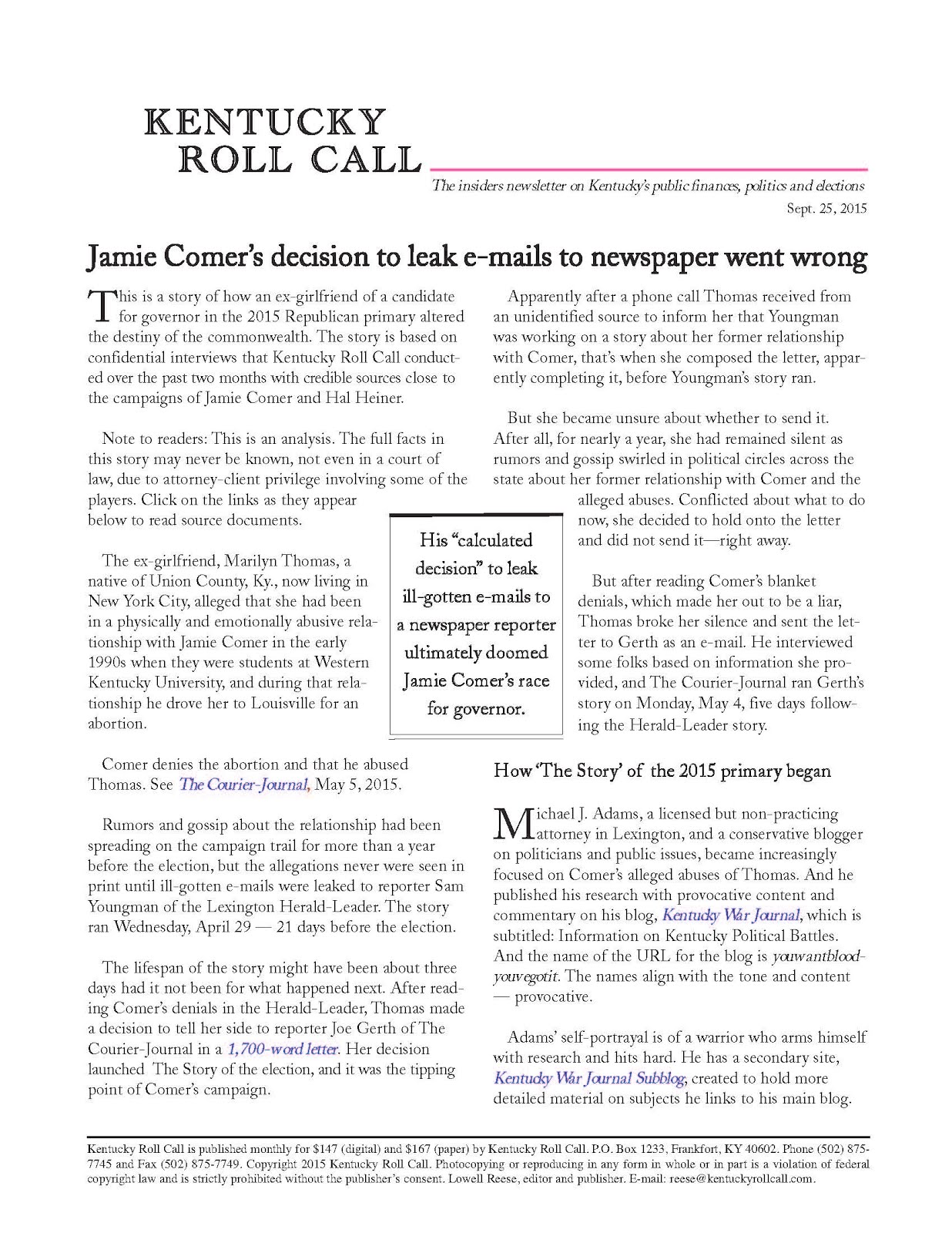The following is an editorial from The Kentucky Gazette, Aug. 14, 2013. Reprinted with permission.
It might surprise you to know that the
employees of 1,169 entities participate in Kentucky’s County Employees
Retirement System. That came to 47,452 retirees and 94,636 employees as of June
2012. Could be more now; could be less.
Most of these
employees are government employees – they work for the water districts and
counties, school districts and cities – and they have earned a government
pension.
But some of
these people are employees of “instrumentalities” of government; that is, they
aren’t true government employees. For this reason, they should not be allowed
in CERS.
We’re
certainly not suggesting that the employees of instrumentalities don’t deserve
pensions. Rather, we’re suggesting that the pensions shouldn’t be provided at taxpayer
expense.
As we know,
most of the revenue in the pension funds is derived from investments (65
percent to 70 percent), and the employees pay into the fund as well (5 percent
or 6 percent, depending on their hire date). But, according to Reuters, roughly
20 percent of Kentucky’s pension fund revenue comes from the taxpayer.
Depending on the national economic climate and returns on investment, this
could be more, could be less. Either way, citizens write the checks to cover
the difference.
CERS, which is
one of the three systems under the umbrella Kentucky Retirement Systems had, as
of June 2012, an unfunded liability of $3.59 billion in its pension plan for
employees in non-hazardous occupations, and a $1.26 billion liability in its
plan for employees in hazardous jobs, a total of about $4.85 billion. These
obligations mean the plans do not have enough money to fully cover retirees,
who’ve earned full benefits, and current employees, who’ve earned partial
benefits. The non-hazardous plan had 60.7 percent and the hazardous plan had
58.1 percent of the money the plans need to pay pension benefits, according to
the 2012 KRS Comprehensive Annual Financial Report, the most recent available.
Twenty percent
of the $4.85 billion comes to $970 million that individuals, business owners
and consumers must redirect from other spending preferences to pay for
pensions, and part of that covers people who aren’t government employees.
Apparently, a
number of these entities work under contract with the local governments or
exist to provide services to government entities. Take the Kentucky League of
Cities, for example, and the Kentucky Association of Counties. It’s been said
here before that these two entities, which both own for-profit insurance
companies that make millions of dollars a year, should not be part of the
public pension system.
Let’s add to
the list the Kentucky Magistrates and Commissioners Association, the Kentucky
Judge-Executive Association, the Riverpark Center, and Housing Oriented
Ministries, to pick out a few.
As near as
we can tell, Hous-ing Oriented Ministries, a non-profit corporation based in
Whitesburg, is a program of the United Church of Christ. Also a non-profit
corporation, the Riverpark Center is an entertainment venue that hosts Broadway
shows, among other programs. And the magistrates and judge-executive
associations should be dropped from CERS because they simply are not government
entities.
To be fair to
current employees, those in the system should be able to continue and accept
the pension promise that’s been made to them. Going forward, though, lawmakers
need to amend KRS 78.510 (3), which gives broad authority to the Kentucky
Retirement Systems board to determine which entities can participate in CERS:
“(I)f the
(retirement systems) board is willing to accept the agency, organization, or
corporation, the board being hereby granted the authority to determine the
eligibility of the agency to participate.”
After
Kentucky’s General Assembly sets CERS right, then members can start on the
Kentucky Employees Retirement System, which has the same problem. KERS
participants include Commonwealth Credit Union, the Kentucky Bar Association,
Nursing Home Ombudsman Agency of the Bluegrass Inc., Judi’s Place for Kids …
You get the picture.
Laura
Cullen Glasscock, editor and publisher





